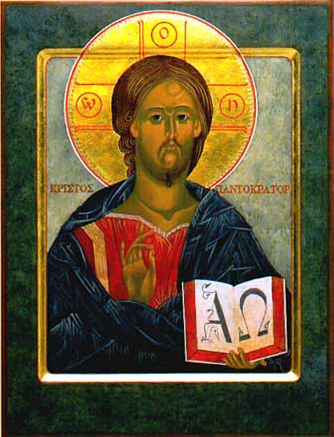Alpha and Omega

Alpha (Α or α) and omega (Ω or ω) are the first and last letters of the Greek alphabet, symbolizing "the beginning and the end," or the divinity and eternity of Christ and a title of Christ and God in the Book of Revelation. “I am the Alpha and the Omega, the Beginning and the End,” says the Lord, “who is and who was and who is to come, the Almighty.” (Rev 1:8; 1:17; 21:6; 22:13). Almighty means that there is nothing greater, stronger, more powerful or infinite than God. He is the “I AM” implying “Being,” “Existence,” “Is.” The roots of symbolizing these attributes of God go back to the Old Testament where, in Exodus 34:6, God is said to be "abounding in goodness and truth". As far as the East is from the West; beyond our comprehension; existing and always the same; never did not exist; it is easier to measure the entire sea with a coffee cup than to grasp God’s existence. If God were subject to space, time and matter, then God would be limited and finite, and therefore not God. The Book of Revelation is the last book of the Bible and is believed to cover those events which surround the end of the world and the Last Judgment. Revelation means to uncover; the disclosure of something that has previously been hidden; a lifting of the veil and in this case, the final triumph of the Kingdom of God. The main theme is faithfulness in tribulation and vigilance. The first and last letters of the Greek alphabet were used because the book of Revelation is in the New Testament, which was originally written in Greek. The Greek Alpha and Omega as a symbol for Christ has been found in the Catacombs, Christian signet rings, post-Constantine coins, and the frescoes and mosaics of ancient churches.
L'Alpha et l'Omega
L’Alpha et l’OmÉga sont les première et dernière lettres dans l’alphabet grec. Elles évoquent donc une idée de commencement et de fin, voire de plénitude. Appliquées à Dieu et au Christ, elles indiquent qu’ils sont principe et fin de toute chose et traduisent la divinité et l’éternité du Seigneur. Dans le livre de l’Apocalypse, Dieu se présente comme « l’alpha et l’oméga, (...), celui qui est, qui était, et qui vient, le Tout-Puissant. » (Ch. 1,8 ; 1,11 ; 21,26 ; 22,13). Tout-Puissant signifie qu’il n’y a rien de plus grand, de plus fort, ou d’infini que Dieu. Il est le « JE SUIS » impliquant « l’être », « l’existence ». Les racines de la symbolisation de ces attributs de Dieu remontent à l’Ancien Testament où on dit que « Dieu (est) riche en bonté et en fidélité » (Ex 34, 6). Aussi loin que l’Est est de l’Ouest, au-delà de notre compréhension, toujours existant et inchangé, Dieu est, et on ne peut saisir Son existence. Si Dieu était soumis à l’espace, au temps et à la matière, Il serait limité et fini, et donc pas Dieu. Le livre de l’Apocalypse est le dernier livre de la Bible et couvre les événements entourant la fin du monde et le Jugement dernier. Il révèle le triomphe final du Royaume de Dieu. Le thème principal est la fidélité dans les tribulations et la vigilance. Les premières et dernières lettres de l’alphabet grec ont été utilisées parce que le livre de l’Apocalypse fait partie du Nouveau Testament, écrit à l’origine en grec. Les noms grecs ALPHA et OMÉGA en tant que symboles du Christ ont été trouvés dans les Catacombes, les chevalières chrétiennes, les pièces de monnaie post-constantiniennes et les fresques et mosaïques d’anciennes églises. Ces lettres sont tantôt écrites séparément et tantôt entrelacées ou composées avec les lettres grecques X et P (= Christ ) ou encore avec la Croix.